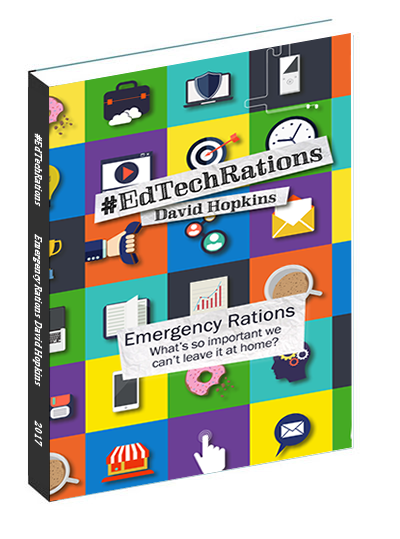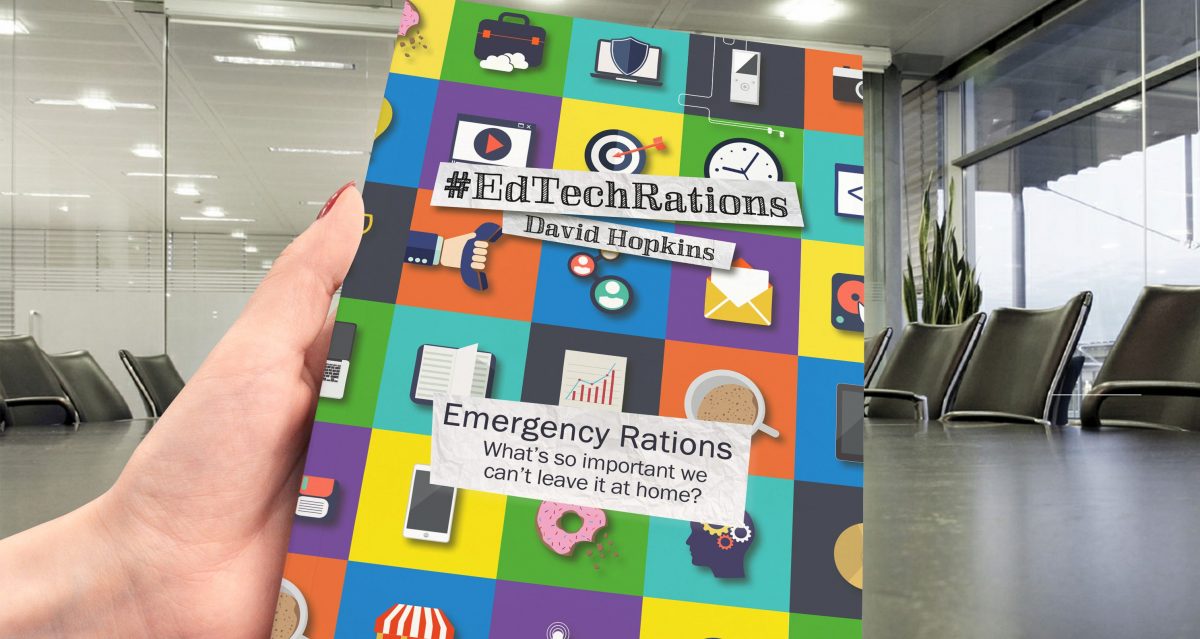Emergency Rations #EdTechRations
 Title: Emergency Rations #EdTechRations: What’s so important we can’t leave it at home?
Title: Emergency Rations #EdTechRations: What’s so important we can’t leave it at home?
Editor: David Hopkins
Word count: 50,000
eBook: £4.93 / $6.00 / €5.68
Paperback: £17.50 / $22.50 / €21.00
Publish date: March 2017
Available: Paper and Kindle editions are available March, 2017.
- Amazon.com (paper & Kindle)
- Amazon.co.uk (paper & Kindle)
“What’s so important we can’t leave it at home?”
This book is a collection of 43 world leading teachers, academics, influencers, critics and practitioners who have answered the question “have you ever walked out the door to go to work, the shops, the gym, etc. and realised you’d forgotten to pick up your smartphone? And then turned around and gone right back for it?”
Have you ever got half-way to work and panicked about how you’d survive the day without the device (or devices) you rely on so heavily (your smartphone, tablet, USB stick, Moleskine notebook, PowerBar charger, etc.)? Do you have a device you don’t mind being without, for a short time, but others you just can’t bear to be apart from?
That is what I mean by ‘emergency rations’ – the stuff you have with you in your life (personal and/or professional) that you would make the effort to go back and get if you’d forgotten it.
A must for your bookshelf, #EdTechRations from leaders of the #edtech community Click To TweetWhat kit do we carry around with us, as teachers, academics, Learning Technologists, Instructional Designers, managers, administrators, thought leaders, change-agents, etc.? What eventualities do we perceive are going to come our way?
As our lives get more digital and our devices get more diverse and hungry for power, we need to stay connected, topped-up, plugged in or just simply want to prepare for that day when faced with our audience, standing at the lectern and panicking because there is a VGA input taunting you, reminding you that you forgot to ask “I’ll be presenting from my tablet … is that OK?”
Is it best summed up by Bill Thompson’s tweet?
Have realised that I very rarely check my phone. I am however umbilically attached to my networked pocket computer, used for many tasks.
— Bill Thompson (@billt) September 12, 2016
In order to answer this I looked to my network for examples of what we use, like, dislike, discard, etc. on a daily or weekly basis. What do we use at/for work and what do we use for personal use – are there overlaps, are there differences? Do we embrace technology for work but shun it in our private life?
Bringing leaders in education together in one volume this book shows how the likes of Steve Wheeler, Eric Stoller, Sue Beckingham, Jackie Carter, Ryan Tracey, Stephen Heppell, Alec Couros, Jane Bozarth, Bryan Mather, Amy Burvall, Julian Stodd, Jane Secker, and more, encounter this question. This book looks behind the tweets, behind the professional veneer and asks the question:
“What is the technology you find yourself turning around and going home for if you forget it. What can’t leave at home or work, what do you feel naked without? (in your bag, in your pocket, wearable, etc.)?”
Full list of contributors to this unique insight into what leading and respected global educators think about their devices:
| Steve Wheeler David Hopkins Ian Wilson Jane Secker Alec Couros Sue Beckingham Sarah Honeychurch Sarah Knight José Picardo Julian Stodd Nick Overton Simon Lancaster Jennifer Jones Darcy Moore Jane Bozarth |
Stephen Heppell Maha Bali Julian Stodd Sharon Tipton Kevin Corbett Joel Mills Neil Withnell Jackie Carter Sam Illingworth Geoff Barton Cormac Cahill Emma King Eric Stoller Steve Collis Matt Lingard |
Amy Burvall Maren Deepwell Chris Rowell Bryan Mathers Joyce Seitzinger Helen Blunden James Clay Wayne Barry Martin Hawksey Linda Castañeda Milena Bobeva Alex Spiers Ryan Tracey Nitin Parmar |
Quote/Reviews for #EdTechRations:
Rachel Challen (@RKChallen), Head of the LTSU, School of Arts & Humanities, Nottingham Trent University:
“This is a fabulous book – full of fascinating stories and images of the technology that heroes of the Educational Technology world hold dear to their hearts. The chapters show why the authors use what they use and the very obvious deep connection with their ‘self’. If you have ever suspected that technology has the power to add to a way of being then this book well and truly confirms it. Technology for communication, to take and curate notes and even technology to help you not lose the technology can all be found here. I’ve certainly found synergies with my own ‘emergency rations’, some surprises, and definitely some items to go on my own shopping list!
There is something for everyone in this book – enjoy.”
Teresa MacKinnon(@WarwickLanguage), Principal Teaching Fellow (e-learning), School of Modern Languages and Cultures, University of Warwick:
“Reviewing this book was like listening to the personal voices of many friends, most of whom I have met through the #EdTech community. Of course, they cannot live without certain technologies, apps and websites – that much was to be expected. What delighted me was the variety of approaches to their contributions, reflecting the different individuals within this connected community. The pragmatists who admit to relying on sensible shoes and stationery, the competitive types with their heart monitors and cycling accessories, the fashion victims, the style gurus, the lovers, the makers, the artists and poets…all have one thing in common. They thrive in the connections that come with the open web. This collection reveals that if you have a PLN you are unlikely to struggle in an emergency!”
Debbie Baff (@debbaff). Senior Academic Developer, Swansea University:
“What a great idea for a book. Packed full of hidden gems and sneaky peeks into people’s purses, bags and pockets. Not only does this highlight some brilliant uses for technology, each chapter also gives a really good flavour of the person behind the technology. I found that I related to the various reasoning and logic for inclusion of stuff in people’s #EdTechRations lists. I was familiar with a lot of the gadgets and bits of tech but was also inspired to try some new stuff out. Maybe some of these new things (new to me at least) will be going on my list of #EdTechRations! What I really liked as well was that you don’t lose sight of the human element amongst all of this technology and that for me is really important. Packed with fab information and really helpful tips about the devices, software and various bits of technological kit (both digital and analogue) that people love to take with them, this book is an absolute pleasure to read. It’s funny, inspiring and informative and is definitely going to be added to my #EdTEchRations of books that I can’t live without (see what I did there ?).”
Derek Moore (@weblearning), Educational Technology Consultant, Weblearning, South Africa:
“It’s been 10 years since my first Tweet. Since then I’ve met and followed dedicated and talented Ed Techies from all over the world. I’ve read musings on Blogger or WordPress, appreciated stunning Flickr and Instagram pics, subscribed to podcasts, laughed at their humour… but strangely never given a thought to the gear required by these prolific peeps as they #workaloud. The #EdTechRations book rectifies this production gap. David [Hopkins] has compiled an interesting backstory to all the kit and gear required to share their online activities. Some have reflected philosophically on how their gear both empowers & enslaves or explored how digital technologies contribute to their capacity. Others have illustrated what rations they have stuffed into their backpacks. Many are surprisingly cautious about new and shiny tech toys. Most have an IOS device. For those who’ve found and followed members of this tribe and retweeted, liked and shared their social publications and profiles, #EdTechRations gives a fascinating insight to the essential tech behind these Ed Techies.”
This book is available to download under a Creative Commons licence (BY-NC-SA 4.0). Further details on how Creative Commons license works on copyrighted materials has been written by Andrés Guadamuz: Publishing a commercial book with Creative Commons.
- Please consider supporting the project, if you like this free copy, by purchasing a paperback copy for your bookshelf or for your Kindle. These are available from Amazon or CreateSpace (indie publisher), depending on which organisation you’d like to get their cut of the sale.
- Word-of-mouth and your networks are also how this book and our work will gain a wider audience. Please share on Twitter, Facebook, LinkedIn, your blog, etc. Send emails or private messages to your colleagues, managers, librarians, friends, groups, associations, etc. Let them know.
- If you wish to share details of the book please link to this page, using this permanent URL – http://www.dontwasteyourtime.co.uk/books/edtechrations/ – and not to the file itself. This means the server can accurately track the number of downloads.


















